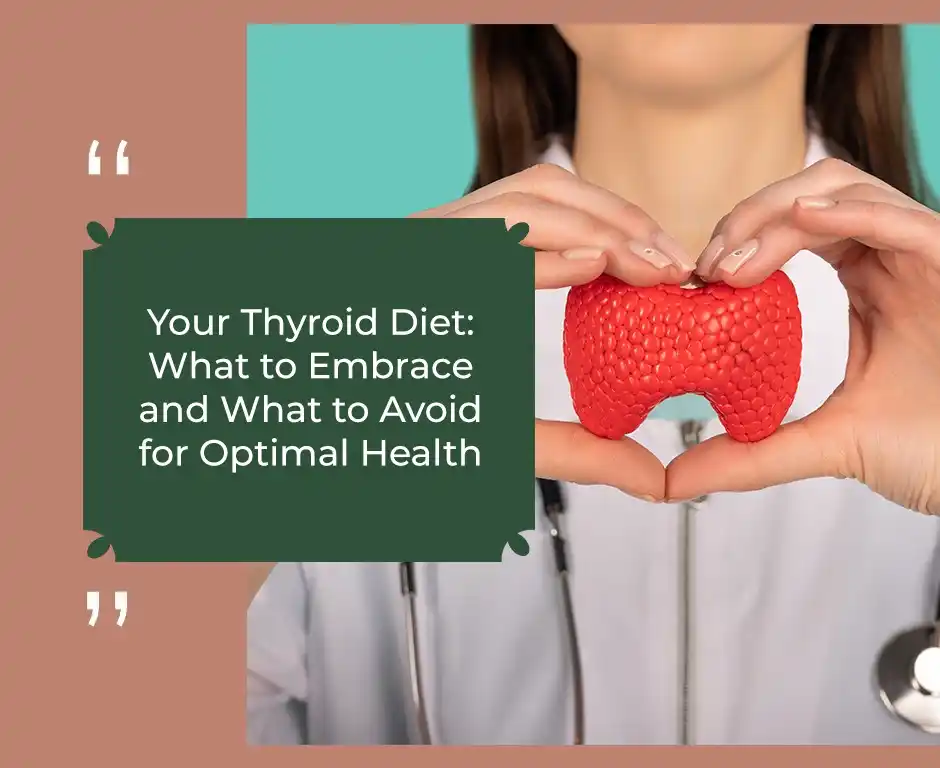Introduction:
Nestled in your neck like a tiny butterfly, the thyroid gland may be small, but its impact on your body is immense. Responsible for regulating metabolism, energy levels, and overall well-being, this gland is a silent hero in your daily life. What’s fascinating is how closely linked your Hypothyroidism Diet is to your thyroid’s well-being. Every bite you take can either fuel or foil your thyroid function. Join us on a journey to uncover the secrets of supporting your Hypothyroidism Diet through food choices, guided by the expertise of The Health Studio.
Foods to Embrace
By incorporating certain foods into your Hypothyroidism Diet, you can nourish your thyroid gland and promote its optimal function. Let’s explore some Hypothyroidism Diet foods that pack a powerful punch in supporting your overall well-being, as recommended by The Health Studio.
Seafood: Rich in iodine, selenium, and omega-3 fatty acids, seafood is a thyroid superhero. Include fish like salmon, sardines, and shrimp to nourish your thyroid gland.
Nuts and Seeds: Almonds, walnuts, and Brazil nuts provide essential nutrients like selenium and zinc. These help maintain thyroid hormone production.
Whole Grains: Opt for whole grains like quinoa, brown rice, and oats. They provide fiber, B vitamins, and minerals necessary for thyroid health.
Foods to Avoid
To safeguard your thyroid health, it’s crucial to be mindful of certain foods that may negatively impact its function. The Health Studio advises on exploring these Hypothyroidism Diet food groups to maintain a harmonious Hypothyroidism Diet in supporting your thyroid’s well-being.
Soy: Soy products contain compounds that interfere with thyroid function. Limit soy-based foods like tofu and soy milk.
Gluten: Some individuals with thyroid issues may be sensitive to gluten. Reduce wheat-based products and explore gluten-free alternatives.
Processed Foods: High in refined sugars and unhealthy fats, processed foods contribute to inflammation and disrupt thyroid balance.
Cruciferous Vegetables: While these veggies (like broccoli and cauliflower) are nutritious, excessive consumption can affect iodine absorption. Cook them to reduce their impact on thyroid function.
Balancing Nutrients
Maintaining a balanced intake of iodine, selenium, and zinc in your Hypothyroidism Diet is essential for thyroid health. Here’s how:
Iodine: Found in iodized salt, seafood, and dairy products, iodine supports thyroid hormone synthesis.
Selenium: Brazil nuts, sunflower seeds, and eggs are excellent sources. Selenium protects the thyroid from oxidative stress.
Zinc: Include legumes, nuts, and whole grains to ensure optimal zinc levels for thyroid function.
Conclusion
Incorporating a Hypothyroidism Diet into your lifestyle can make a significant difference. Remember, while food choices matter, consulting a healthcare provider is crucial. They can tailor dietary advice to your specific needs. So, embrace Hypothyroidism Diet foods, avoid the culprits, and prioritize your thyroid health with guidance from The Health Studio! Remember, this blog serves as a guide, but personalized advice from a healthcare professional on Hypothyroidism Diet is essential. Let’s nourish our thyroids and thrive with support from The Health Studio!






